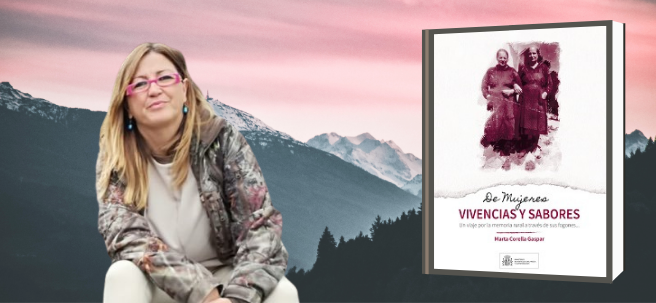
08 de February de 2021
02/08/2021. Orea is a mountainous town in Guadalajara bordering Teruel, located in the Alto Tajo region, at the foot of the Tremedal mountain range, between the Albarracín and Cuenca mountains. Its current population is 181, although this number can quadruple during holiday periods.
- Marta Corella, mayor of Orea (Guadalajara), publishes the book "Of Women, Experiences and Flavors"
 |
Its mayor, Marta Corella, has just published a book entitled "Of Women, Experiences and Flavors," a work that appears to be a cookbook, but goes much further. Each recipe contains stories of her ancestors, the legacy of women in the villages, and, ultimately, a rescuing of rural memory.
National Rural Network: “Every meal is a story, every story has its own food, and each one is filled with lives woven around a fire.” Marta, why is the book so much more than a cookbook?
Marta Corella: The book begins in the last century, at the beginning of the 20th century, and spans various important milestones in our country's history and events that shape the lives of the book's various characters. Above all, these milestones answer the questions: What have we done to get here? And what happened to get us where we are? Why isn't traditional knowledge valued? Why do young people leave the villages? Why is it so difficult to live in a village?
The book is more than a cookbook, for this reason, because it tells 23 stories that emphasize the bonds between rural inhabitants, the unwritten rules that underpinned coexistence and the development of rural areas. Rules and a coexistence in which women have always been the fundamental pillars, caring for animals and family members.
RRN: So do you have an answer to the question of what has been done to cause the rural culture of the villages to be abandoned until now?
MC: There's been a process of deliberate invisibility . Investment in the villages has stopped. And that lack of investment is what brought us to where we are. This denigration of rural life is what made our parents strive to give us university degrees only to send us to the city. The people of the villages themselves believed there was no future there.
RRN: Can the pandemic reverse this process of distrust in rural life?
MC: The pandemic makes it clear that our system is obsolete. We need to change the paradigm . Above all, that of our relationship with the planet. Capitalism has improved our living conditions, but it has left ethical and moral values behind. What can't be bought? The air you breathe. And that's found in nature. With the pandemic, people do see villages as safer places to live. And they truly are. And given that new technologies allow, for example, a drone to deliver a package anywhere... the paradigm shift is about to occur. Major capitals are already focusing on uninhabited areas.
To illustrate what I'm saying, there are three students in Orea studying at an American university. I'm convinced that villages are the places where our grandchildren will want their families to live.
RRN: Do you believe that as long as there are towns and people in towns, there is memory?
MC: More is needed to preserve memory. Educational centers (schools, colleges, and universities) must be linked to traditional knowledge. Integrated management of the territory is necessary: population, energy, medicinal and aromatic plants... a whole. Likewise, studies must be integrated with the territory ; they cannot be outside it.
RRN: Is your work as mayor a source of inspiration for your writing?
MC: My six years as mayor do inspire me and inspire me to write. I'm motivated to tackle all the management challenges I encounter and capture them in writing. Governing a town of about 200 inhabitants at 1,500 meters above sea level in the mountains with a small budget and many limitations... is an exciting challenge!
RRN: Neither empty nor emptied Spain: “donor Spain.” Explain this concept you have coined.
MC: It's not the empty Spain, because we still live in it. It's not emptied either, because that's a process that hasn't yet happened. It hasn't concluded in itself; perhaps it never will. Our Spain is a donor because it produces and generates quality food and products. It's a donor of environmental sustainability and a donor of talents who have been sent to work in the city.
RRN: And what measures do you propose to reverse the process of rural depopulation?
MC: The cornerstone lies in the depopulation measures. They need to be reviewed and adapted: relocating educational and community centers, as well as public administrations. Civil servants should be able to work in the villages and see it as a source of prestige, not the other way around.











